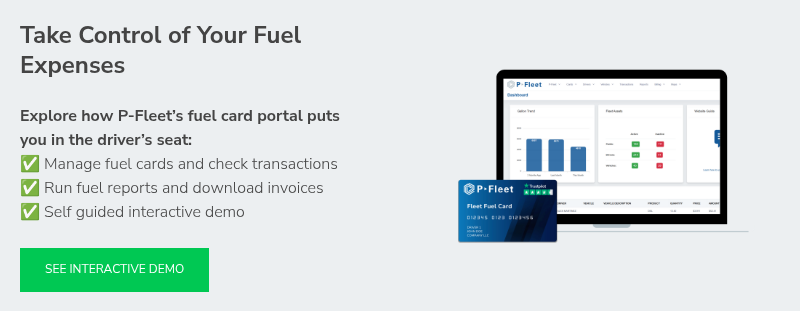
Fuel card reports are often the most overlooked, yet one of the most useful features of a fuel card. Instead of combing through credit card statements or chasing paper receipts, you can pull detailed fuel reports from your fuel card portal that save hours on accounting and fleet compliance reporting.
In this guide, we break down the most common types of fuel card reports, how businesses actually use them, and how to connect fuel card data to your accounting and GPS software. Whether you’re filing IFTA, tracking fuel by driver or vehicle, managing on-site tanks, or settling with owner-operators, you’ll see how the right fuel card reports can save time, reduce errors, and give you better insight into your fuel costs.
Table of Contents
- Types of fuel card reports
- Popular fuel card reports
- How to connect fuel card report data to your accounting and GPS software
Types of Fuel Card Reports
| Fuel Card Report | Description | Use Cases |
| Transactions report | Allows you to view all transactions. Can be filtered by card, driver, or other information. |
|
| Real time transactions | Allows you to view all approved and denied transactions in real time. |
|
| Fuel summary report by driver or vehicle | View summary of transactions by account, driver, vehicle, or department. |
|
| Fuel summary by department | View summary of transactions by department or GL code. |
|
| IFTA fuel report (fuel summary by state) |
View total gallons purchased in each state. | Use fuel data by state to easily create your IFTA reports. |
| Card, driver, or vehicle report | View all active/inactive cards, drivers, or vehicles for your account. | Take inventory of your account to cancel, add, or adjust fuel cards. |
Popular Fuel Card Reports
Here are some of the most common reports we see fleet managers, business owners, and accounting teams use.
1. IFTA Reports
If your trucks cross state lines, you’ll need to file IFTA reports on a quarterly basis. And if drivers are fueling with cash or a regular credit card, pulling together receipts for that report can turn into a mess fast.
Fuel card IFTA reports save a ton of admin time by automatically organizing purchases by vehicle and state, so you’re not chasing receipts or manually logging every fill up. Just download the report in Excel and you’ll have all the fuel data you need to copy and paste into your quarterly IFTA filing.
2. Annual Fuel Tax Reports
Gathering fuel expense records for taxes is easy with fuel cards. You can simply run a fuel summary report for the entire year and submit it to your tax accountant. It will have a breakdown of all transactions as well as the summary of total dollars spent on fuel for the year.
3. GL Code Reports
Almost every business tracks spending with general ledger (GL) codes, but it gets time consuming fast if your accounting team is sorting through fuel receipts or searching through a credit card statement to tag transactions with the right GL code.
That’s where GL code reporting helps. Instead of coding everything manually, transactions are automatically grouped based on the GL codes you set. Depending on what you need, you can tie GL codes to specific cards, vehicles, drivers, or even product types.
When you’re setting up your account, ask your fuel card provider about building a GL-coded report that matches how you track expenses internally. A little planning upfront can save your team a major headache every time invoices hit.
4. Off Road Diesel Refund Reports
If your business uses diesel for off road equipment, you may qualify for an off road fuel tax refund. The challenge is separating the gallons used off-road from the gallons used on-road, because you have to document it correctly to file the claim.
Fuel cards can make this much easier by automatically flagging off-road transactions in reporting. With Level III data, you can capture the details you need for refund documentation, including fuel type, date, vehicle or equipment, state, and the location of each purchase, so you’re not sorting receipts by hand.
5. Monthly Transaction Report
A monthly fuel transaction report gives you a clean snapshot of your fuel spend. You can segment the data by driver or vehicle, or pull a full account view. This report breaks out total gallons, price, total spend, and taxes (federal, state, local, and sales), so your operations and accounting teams get the data they need.
6. On-Site Fuel Tank Fueling Reports
If you fuel from an on-site tank, tracking who used what can get tricky fast. But you still need that visibility by driver and vehicle to keep gallons accountable and cut down on misuse.
The good news is you can set up reporting that covers everything, even when fuel is coming from your own yard. Work with your provider to issue cards that work both on the road and at your on-site tank. That way, on-site transactions roll into the same reports as off-site fill-ups, so you get one clean view of all fueling activity.
7. Owner-Operator and Contractor Fuel Card Reports
If you work with owner-operators or contractors, it can be a pain to pull together the fuel transaction details you need for settlements. That’s where owner-operator reporting comes in. You can run a fuel summary by driver for the settlement period and get a separate page for each owner-operator showing every transaction, making it easy to attach directly to their settlement statement.
How to Connect Fuel Card Report Data to Your Accounting and GPS Software
Connecting your fuel card data with your accounting software eliminates manual fuel expense entry. And when you connect fuel data to your GPS software, you can combine fueling and GPS data in one place for cleaner reporting and better fleet oversight. Here are the two main ways to connect your fuel card data with the systems your company already uses.
Export Fuel Card Data
Fuel card reports can be exported into several different file types so you can format the data to upload into your accounting or GPS software. Here are the ways you can export fuel card reports.
Fuel Card Report Export File Formats
- Excel
- CSV
- PDF
Fuel Card Integrations
Some fuel card providers offer built-in API integrations that automatically sync fuel card data with your accounting and GPS software. That means fuel transactions flow straight into the systems you already use, without having to download or manually upload files.
Simplify Your Fuel Reporting with P-Fleet
P-Fleet fuel cards come with the reports you need for IFTA filing, annual fuel tax reporting, GL-coded summaries, and more that can be accessed any time in your fuel card portal. Instead of chasing receipts or piecing together data from multiple sources, you get clean, structured reports by driver, vehicle, state, department, or GL code, ready to download and use.
With P-Fleet, you can export reports in Excel, CSV, or PDF, to connect with your accounting and GPS software or create custom reports for your business needs. That means fewer errors, faster closeouts, and better visibility into fuel spend across your entire operation.





